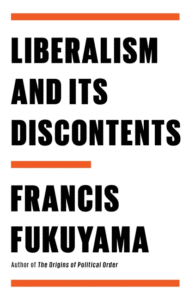
5 Book Reviews You Need to Read This Week
Ryan Ruby on a Moby-Dick Sequel, Pico Iyer on a Pilot's Memoir, Marie-Helene Bertino on a Tale of Vanishing Mothers, and more
Our feast of fabulous reviews this week includes, Marie-Helene Bertino on Alexis Schaitkin’s Elsewhere, Ryan Ruby on Pierre Senges’ Ahab (Sequels), Michael Brenes on Francis Fukuyama’s Liberalism and Its Discontents, Pico Iyer on Mark Vanhoenacker’s Imagine a City, and Hugh Ryan on Davey Davis’ X.
Brought to you by Book Marks, Lit Hub’s “Rotten Tomatoes for books.”
*

“One of the many advantages of writing in the speculative realm is the opportunity to clear the decks of societal expectations. To upend, poke fun at or hyperbolize the silliest of rituals or darkest of human flaws. It is often revealing, then, to notice which of these archetypes the speculative writer reserves and which they jettison … Without any signifiers of location and time, Schaitkin’s narrative seems to reach for a sense of universality, and intentionality: as though every element of this carefully crafted theater has been placed there for a reason. It’s not what Elsewhere elides but what it preserves from our world that is the most telling … Schaitkin chooses to leave intact our culture’s misogyny and reproductive pressures. Readers might long for a sympathetic, perhaps child-free outlier to reimagine, this female plight and bring some semblance of resolution into focus. But such an anomaly never materializes, and even strangers still reinforce the status quo when it comes to gender roles. Even as the plot completes a satisfying loop, Vera maintains the prejudices she had at the start and, most unusually, never questions her own certain motherhood. Perhaps this is the real speculative element: a mother with no traces of ambivalence … A welcome addition to a shelf of speculative fiction about the joys, failures and metamorphoses involved in having a child, Elsewhere asks: Is motherhood, like the town itself, meant to be a featureless place, best experienced under a haze of collective brainwashing?”
–Marie-Helene Bertino on Alexis Schaitkin’s Elsewhere (The New York Times Book Review)

“The zany premise of Ahab (Sequels) could have been dreamed up by Eli Cash, the writer played by Owen Wilson in Wes Anderson’s 2001 film The Royal Tenenbaums: ‘Well, everybody knows that Captain Ahab dies at the end of Moby-Dick. What this book presupposes is… maybe he didn’t?’ … Senges makes no attempt to reconcile the two incompatible origin stories he gives for Ahab; the point, rather, is to satirically undercut the originality of Melville’s masterpiece by attributing it to someone else … Senges’s persistent use of anachronism…suggests that the Great White Way and Golden Age Hollywood are in fact merely stand-ins for a satirical target that is nearer to hand: the totally marketized culture of the 21st century … In Melville’s epic, the singular Ahab goes on a hunt for an equally singular creature; in Senges’s satire, everything and everyone has become generic: an act, an imitation, a copy, a plagiarism—a sequel. Yet the way Senges constructs Ahab (Sequels) represents such a radical departure not only from the conventional realist novel but also from the American postmodern novels with which it would seem to have the most in common that it amounts to a kind of sabotage. At the level of form, the book explodes its potential as a commodity and, collaterally, the customer service logic of justifying aesthetic choices exclusively with reference to a reader’s pleasure. In doing so, Senges does not merely seek to place Ahab (Sequels) in the vestigial tradition of avant-garde writing; he also seeks to recapture something of its lost social function.”
–Ryan Ruby on Pierre Senges’ Ahab (Sequels) (The Nation)
“The world has been remade again. Yet if there were reasons to be optimistic about democracy in 1989, there’s little of that now: instead, fears about the demise of liberal democracy are rampant—in Europe and in the United States as much as anywhere else. So, now, as white nationalism and necropolitics animates the U.S. Republican Party, as over one million Americans have died from the Covid-19 virus, and as climate change has wreaked unmitigated, irreversible damage to world stability—not to mention mass incarceration operating as the primary solution to unemployment and poverty—what ambitions demarcate our era, what paradigm will determine our new order? What is to be done, dear Francis? The best Fukuyama can muster, as conveyed in his new book, Liberalism and Its Discontents, is to mount a ‘defense of classical liberalism’ … Fukuyama is now included among a cadre of centrists who’ve built careers advocating for a liberalism that avoids ‘extremes’—always evolving—on the left and the right since 2016. But unlike those making a career out of easy posturing against ‘illiberalism‘ and ‘populism,’ Fukuyama actually cares about ideas … He is someone who surprises readers with transient moments of contrarianism. In his current defense of classical liberalism, he swerves against neoliberalism…Fukuyama’s takedown of neoliberalism makes the book an interesting read for a moment, but it becomes hollow and deflating as the criticism gets lost in his attachment to ‘economic individualism’ as the locus of liberalism … he chooses to ignore how the fall of communism engendered U.S. imperial adventurism that led to failed projects of nation-building. How did liberalism allow for the expansion of exorbitant military power—even if Fukuyama wants to argue liberalism did not create it—to the point that it curtailed the rights of peoples at home and abroad, that gave license for interventionism without restraint; that deprived Iraqis, Afghanis, and Somalians of another fundamental principle of liberalism: the right to live? … Unable to arrange history in a triumphalist narrative, in an arc that bends toward democracy, Fukuyama asks us to forget the present to preserve the past.”
–Michael Brenes on Francis Fukuyama’s Liberalism and Its Discontents (The Baffler)
“A little like Italo Calvino, in his fanciful Invisible Cities, he decides to conjure up some of the places he has known, with that almost unique kind of familiarity that comes from visiting them dozens of times, but seldom for more than a couple of days … What makes this captain of the heavens so appealing is a kind of all-American innocence that helps him savor ‘the palmistry of lit streets’ in Salt Lake City, seen from 38,000 feet above, as eagerly as he devours the poets of Delhi when touching down for 48 hours. Linking the places he flies between through snow, or gates, or the color blue, Vanhoenacker, meticulous enough to offer a 16-page bibliography, seems to have a near-bottomless appetite for fresh sights and guidebook curiosities … His autobiographical vignettes are searching and touching, delivered with an affectionate lyricism that brings home to us how his small town has become a kind of anchor in a mobile life and maybe even the place to which he’ll return when he retires. But for me the real distinctness of his work comes from the life he enjoys at cruising altitude … There’ve been plenty of books about cabin attendants’ adventures as part of a globe-trotting sorority bringing the mile-high club down to earth; Imagine a City is a much more intimate and thoughtful work from a man who, seeing ‘the small metal plate on which an arrow indicates qibla, the direction of Mecca’ in that hotel room in Abu Dhabi, uses it ‘to estimate the initial direction of the great circle route’ that will take him and his big bird back to London as the light comes up again.”
–Pico Iyer on Mark Vanhoenacker’s Imagine a City: A Pilot’s Journey Across the Urban World (AirMail)

“X is lyrical and nonlinear, with sentences that feel like carved obsidian: dark, sharp and shiny. Here, however, the voice is less poetic and more terse, like the patter of a hard-boiled detective from a classic film. This is a queer noir world, full of inexplicable violence, an encyclopedia’s worth of sexual deviance and a deeply flawed, untrusting and untrustworthy antihero. At times, Davis’s styling goes too far, torquing sentences into awkward shapes…but the overall effect is masterly, a perfect mating of style and subject … Not all readers will be able to personally identify with the novel’s stories of sexual waterboarding, but many will recognize the experience of devouring, adjudicating and enjoying the worst (and often last) days of someone’s life for entertainment. With TV, movies, podcasts, etc., death spectating is now a booming business—our modern Coliseum. Again and again, X shows us how sex and death are entangled for many people, not just BDSM queers from the future … X documents a dystopia that has only just arrived, suggesting that perhaps there was a moment when we could have taken a different path. That moment? It’s now. Now. Now. X will leave you, in the same way it leaves its narrator, wondering: What are you ignoring? What can’t you admit to yourself? And is it already too late, or have you just given up?”
–Hugh Ryan on Davey Davis’ X (The New York Times Book Review)
Book Marks
Visit Book Marks, Lit Hub's home for book reviews, at https://bookmarks.reviews/ or on social media at @bookmarksreads.






















